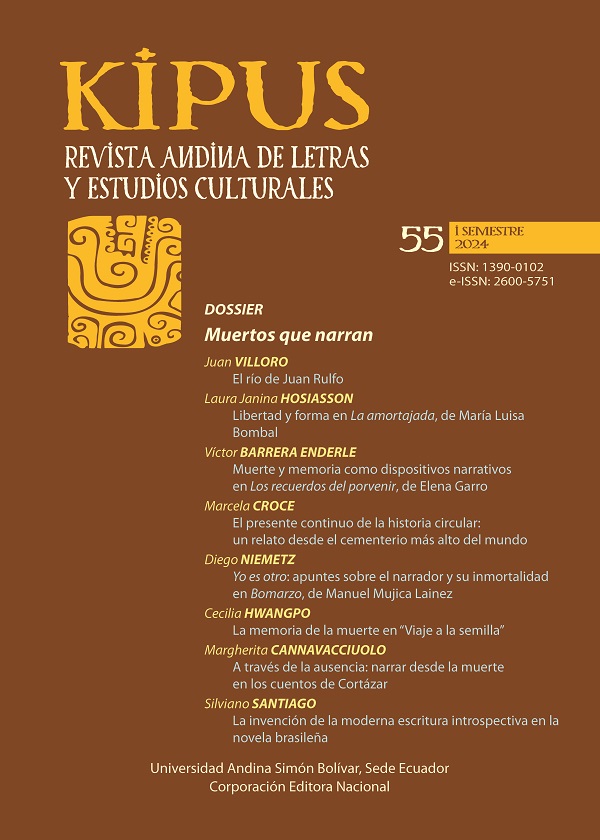The Present Continuum of Circular History: A Story from the Highest Cemetery in the World
DOI:
https://doi.org/10.32719/13900102.2024.55.4Keywords:
Circular History, Heterogeneity, Myth, Irony, ChronicleAbstract
Redoble por Rancas (1970) by Manuel Scorza is a story in which the most reliable version of the outrage and extermination of a population is that of the dead. The violent events that took place in the town follow the circular (conservative) conception of history, but the intervention of the characters, with reduced resources of a fantastic kind, introduces some breaks in the representation that disrupt the presumably immovable nature of the series. The article reestablishes the link of the initial novel of the pentalogy La guerra silenciosa with the development of the whole, evaluates the Mariateguian impact on the saga and relocates the narration within Latin American literature of the 20th century.
Downloads
References
Arguedas, José María. 1956. Puquio: una cultura en proceso de cambio. Lima: Instituto de Estudios Etnológicos.
Cornejo Polar, Antonio. 1984. “Sobre el neoindigenismo y las novelas de Manuel Scorza”. Revista Iberoamericana 50 (127): 549-57.
–––. 2011. Escribir en el aire. Ensayo sobre la heterogeneidad socio-cultural en las literaturas andinas. Lima: Centro de Estudios Literarios Antonio Cornejo Polar / Latinoamericana Editores. Crisis. 1974. Dossier Manuel Scorza, n.º 12, 40-9.
Escajadillo, Tomás. 2012. “Scorza antes de la última batalla”. En Narradores peruanos del siglo XX, 239-51. Lima: Lumen.
Gras Miravet, Dunia. 2003. Manuel Scorza. La construcción de un mundo posible. Murcia: Asociación Española de Estudios Literarios Hispanoamericanos.
–––. 2023. “Biografía de Manuel Scorza”. Accedido 26 de junio. https://www.cervantesvirtual.com/portales/manuel_scorza/autor_apunte/.
Graziano, Silvia, 2015. “Libros por tres soles. Manuel Scorza y la Organización Continental de Festivales del Libro”. La Plata: IX Congreso Internacional Orbis Tertius de Teoría y Crítica Literaria.
Jameson, Fredric. 1981. The Political Unconscious: Narrative as a Socially Symbolic Act. London: Methuen.
Mariátegui, José Carlos. 2005. 7 ensayos de interpretación de la realidad peruana. Buenos Aires: El Andariego.
Moraña, Mabel. 1983. “Función ideológica de la fantasía en las novelas de Manuel Scorza”. Revista de Crítica Literaria Latinoamericana, año 9, n.º 17: 171-92.
Paris, Robert. 1981. La formación ideológica de José Carlos Mariátegui. Ciudad de México: Siglo XXI Editores.
Scorza, Manuel. 1981. La tumba del relámpago. Ciudad de México: Siglo XXI Editores.
–––. 1997. Redoble por Rancas. Hardmonsworth: Penguin.
Sternhell, Zeev, Mario Sznaider y Maia Asheri. 1994. El nacimiento de la ideología fascista. Ciudad de México: Siglo XX Editores.
Vargas Llosa, Mario. 1995. La utopía arcaica. José María Arguedas y las ficciones del indigenismo. Ciudad de México: Fondo de Cultura Económica.
White, Hayden. 1992. Metahistoria. Ciudad de México: Fondo de Cultura Económica.
Downloads
Published
How to Cite
Issue
Section
License
Copyright (c) 2024 Kipus: Revista Andina de Letras y Estudios Culturales

This work is licensed under a Creative Commons Attribution-NonCommercial-ShareAlike 4.0 International License.







.png)
